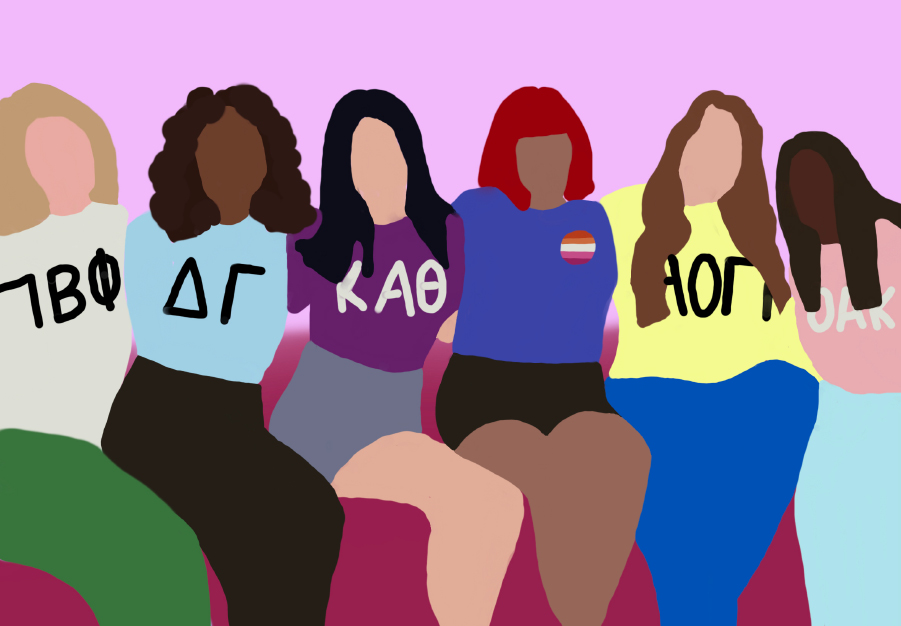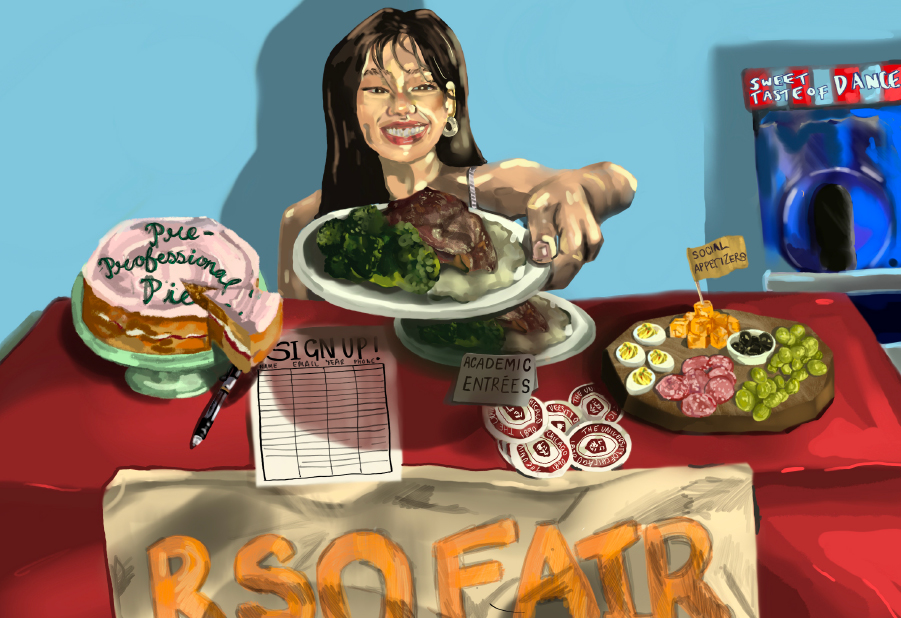Like many of the women in Greek life at UChicago, I didn’t think I’d join a sorority in college. The stereotypes aren’t uncommon: Everyone in sororities is blond, basic—bitchy, even—none of which I see myself as. I knew, of course, before coming here, that UChicago is far from a party school and that Greek life here would probably be different from what I pictured at a Southern state university. Even still, while I signed up for rush last fall, I couldn’t bring myself to go through with it. I felt like I didn’t know enough about Greek life to commit to it so early in my college years.
My reservations about getting involved with Greek life were quickly dispelled, though, as I got to know more women in sororities and learned that they were much more relatable than the stereotypes in my head had suggested. Sometime in the middle of my first year, I realized that I desperately wanted a way to connect with more like-minded people on campus. When the pandemic hit, I knew that meeting new people would be harder than ever. So, with the encouragement of my roommate, I decided to rush again this fall, and joined Delta Gamma (DG). As apprehensive as I might have initially been, I can confidently say that joining Greek life was one of the better decisions I’ve made since coming to campus.
I’ve never considered myself to be a good example of the typical UChicago “quirky” character. Throughout first year, while I did make many dear friends, I found that I didn’t really have a lot in common with many of the people I happened to encounter in my day-to-day life, such as some of my housemates. I’ve found DG to be particularly valuable in giving me an opportunity to find a community I belong in—people whom I could spend several hours talking with the first time I meet them; people who I spontaneously discovered shared some of my most random interests like learning languages or criminal justice research; and most of all, people whom I know I can relax, be myself, and have fun around. I remember thinking during rush that I could see myself being friends with almost every woman I spoke to in DG. And I was initially skeptical about this translating to the entire chapter of nearly 200 people—another misconception about sororities is that we all secretly hate each other—but the sense of community is something that I’ve found to be just as strong even after joining.
This has been important particularly during a pandemic, when opportunities to meet new people have been so limited. In DG, I’ve gotten to meet all kinds of different, diverse women who value our organization's mantra of “doing good.” I’ve made friends I can genuinely count on, despite having not known them very long. And beyond friendship, whether it’s finding a study buddy, a mentor I can reach out to for advice on internship recruiting, or someone to teach me Excel for some coursework, joining a sorority has given me a support system for all kinds of little things that I didn’t realize would add up to be so valuable. It’s a tightly knit community that I wouldn’t really have been able to find elsewhere.
That is not to say that Greek life in general doesn’t come with its own issues, including institutional class and race barriers. But what I admire about the women I’ve met in DG is that they strive to address the chapter’s specific issues to make the sorority experience better for existing members, and easier for potential new ones to choose to join us. In response to financial concerns, I’ve seen our vice president of finance work to make dues as low as the national executive offices will allow, and I’ve been proud to work with our honor board to create alternatives to fines. In an effort to combat Greek life’s history of excluding people of marginalized backgrounds, I’ve been in meetings where we’ve discussed ways as a chapter to create liaisons with our multicultural organizations on campus, after we address our own issues to the best of our ability. In order to tackle the problem of sexual assault in Greek life, I’ve seen leadership plan a new, comprehensive reporting and prevention policy for chapter members as well as conduct workshops on how we can learn to support survivors. And this has just been the beginning. As a financially independent woman of color myself, I’ve been so proud to see my fellow DG members strive to reform the chapter’s policies and operations in response to these institutional issues.
I can’t argue that DG or Greek life as a whole is perfect. And I certainly can’t speak for every chapter on campus or every UChicago student in the system. Greek life is something that will always have its critics, and not for invalid reasons. But what I can say is that I’ve seen my chapter commit to learning from criticisms, implementing reforms, and becoming more institutionally inclusive—and I couldn’t be happier about it. Joining DG has been a crucial component of my college experience in these months so far, and I can tell that it will only become more important in the future as COVID-19 restrictions are lifted. Sororities definitely aren’t for everyone. But for those of you who might be considering rush, don’t be deterred by all the posts on UChicago Secrets—you might find that it shapes up to be a lot more than what you think it is.
Manya Bharadwaj is a second-year in the College.







